Alien: Romulus: The Cinemorph
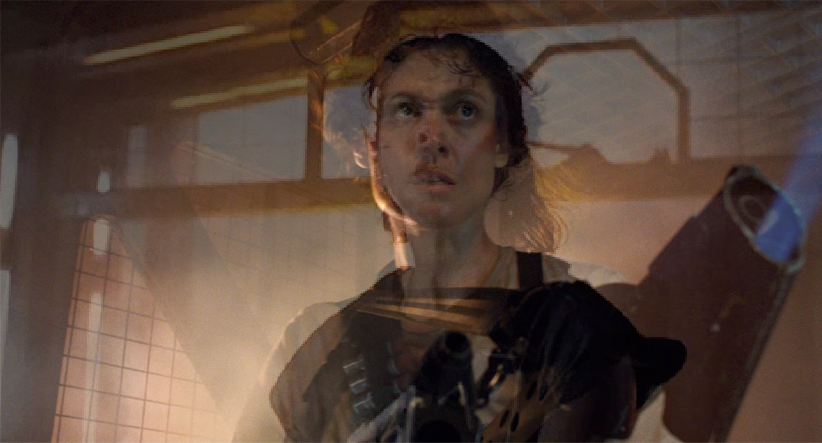
I. Hell of a Defense Mechanism, You Don't Dare Kill It
Everything that happens in Alien: Romulus can be traced to a salvage team of the Weyland-Yutani corporation traveling to the remains of the ore-hauling ship of the original Alien, and finding what they're looking for: the creature that Lt. Ellen Ripley blew out of the airlock in that movie's ending. This is not a spoiler, it is one of the very first things we see. It indicates the movie's priorities: to remind its audience, explicitly and insistently, of the old movies they love. It also provides a useful metaphor for the Walt Disney Company itself, sifting through old wreckage for an intact relic they can dissect and manufacture for their own purposes.
The Alien series has been bad more often than it has been good, but it has endured due to its first two entries skewing its batting average astronomically high. The claustrophobic atmosphere of Ridley Scott's direction of Dan O'Bannon and Ronald Shusset's spare and naturalist script for Alien remains palpable on rewatch. It does this even though the monster's groundbreaking design by Swiss artist H.R. Giger no longer shocks. James Cameron managed the impossible task of following and matching Alien by realizing that and scaling up, throwing an entire alien colony at audiences to put them back into uncharted territory. The result, Aliens, remains a brilliant action film, arguably Cameron's best.
It was the best possible outcome for an Alien sequel, but it was also a curse for all future follow-ups. Barring the escalation to a full alien planet, which was proposed for the third film but considered too expensive, there really wasn't anything to do with the xenomorph that wouldn't just be variations on the themes of Alien and Aliens. Alien³'s messy conception and birth stemmed from the producers never fully resolving this foundational issue of what direction to take the series, and it continued to flail in various directions afterward: a tonally grotesque attempt at directly continuing "Ripley's" story in 1997's Alien Resurrection, unapologetically dumb monster mash-ups in the two Alien(s) vs. Predator films, a teased xenomorph origin story in Ridley Scott's 2012 return to the franchise Prometheus, which then became a resentfully explicit origin story in 2017's Alien: Covenant. Most of these movies have their defenders (mostly, pretty much everyone agrees Aliens vs Predator: Requiem is garbage), but they are all uneven at best.
Fans were still waiting for a sequel that lived up to the legacy of the originals when the Walt Disney Company announced its purchase of 20th Century Fox at the end of 2017. Any possibility of a Ridley Scott-helmed Covenant follow-up, and an endlessly teased but scarcely developed Aliens sequel from District 9 director Neil Blomkamp, was dashed once the merger was completed in 2019. The future of the franchise was an open question even after Alien: Romulus was announced in 2022: what would family-friendly Disney do with these dark and bloody movies?
II. Is This Gonna Be a Stand Up Fight, Sir, or Another Bug Hunt?
After its prologue, Alien: Romulus' story proper introduces us to Rain (Cailee Spaeny), an orphan working along with her adopted andoid brother Andy (David Johnsson) on a Weyland-Yutani mining colony, Jackson's Star. Rain's plans to ship off to her dream planet Yvaga are denied by the company, and so it takes very little for her to agree to her ex-boyfriend Tyler's (Archie Renaux) plan to commandeer a derelict ship with enough cryotubes for her and their their friends to make the journey to Yvaga. Things don't go according to plan. It's not a bad setup, though it is best not to dwell on the story's implications for Aliens.
The movie's biggest asset, its production design, is most abundant in the early stretch. Jackson's Star is exactly the kind of harsh steam-and-chains environ that the early films excelled in, with a healthy dash of Blade Runner's ominous black-and-lights buildings. Sets and props are appealingly practical. This is at best mimicry, but it is capably done. The working-class setting harkens back to the first movie, the colony name is a riff on the terraforming colony of Aliens, Hadley's Hope, and the lighting and even some of the music cues recall the industrial gloom of Alien³, as intended.
Yet the parts where this familiarity falters render it uncanny, a sleek and shiny doppelganger: the crisp digital photography betrays the contemporary production, and the young and photogenic cast inherently undercuts the attempts at adult grit. None of Alien's 30-skewing cast looked like movie stars, not even Sigourney Weaver, who starts that film as just another member of the proletarian ensemble and only emerges as leader and film lead over time. That hands-off approach to the storytelling remains part of why the movie is still effectively tense. Here Rain is the clear Protagonist, with a lot of Drama with the other characters that will by movie's end have formed an Arc. This is not nearly as inane as the human subplot of AVP: Requiem, but it is programmatic and over-determined and never shakes the feeling of a fashionably Young Adult Hunger Games-style dystopia. Even at its best Romulus feels hyper-competent but not inspired, and the production design is only the beginning of its cannibalization of the original films.
III. It Has Memories. Why Does It Have Memories?
Is it a spoiler to talk about how bad Ian Holm's estate is at their job? A spoiler nominally ruins a surprise, which implies something new and novel. Disney's ghastly digital necromancy here, creating an AI-augmented puppet of Holm's likeness as Ash in Alien as they did to Peter Cushing in Rogue One, is as far away as it is possible to get from 'new.'
Voiced by Daniel Betts, "Ian Holm" plays Rook, a droid that survived the attack which turned the Romulus into a ghost ship, who begins manipulating Andy into serving the interests of Weyland-Yutani because of course he does. This does lead the movie to one of the movie's only new ideas, a perfectly logical droid being given a trolley problem of whether to let one person die to save several more. This is treated as self-evidently villainous, the equivalent of Ash's willingness to feed everybody to the beast if it benefits the company, despite that risk being Ripley's stated reason in the original Alien for not letting a contaminated crewmate back on—an order overriden by Ash, no less.
I digress. The ghoulish use of Holm's likeness is disgusting enough on its own, but it's made worse by how often the script has Betts just puke out Ash's most famous lines, "perfect organism," "you have my sympathies," etc etc, in the most sneering villain fashion. It is the worst example of the movie's pandering, but far from the only one.
The self-referentiality, the re-doing of famous lines and shots and scenarios without their original context, is constant. It starts even before the movie does: the 20th Century Studios logo uses the exact same sustained final off-note from Alien³'s Fox fanfare. It was in that movie for intrinsic reasons—announcing up front that things are going to get ugly—but here it's just a reference for fans to catch, even if they want Alien³ stricken from the record. Other callbacks are much more overt and even less welcome. "Get away from her you bitch" is along with Rook the lowest point, having only slightly more motivation in-movie than a fan aggressively quoting Aliens at the people around him. I have never been reminded of the Simpsons "Say the line" meme as often as I was watching this.
To the movie's credit the action scenes include some new approaches, including an escape from a swarm of facehuggers and a hallway of acid blood in zero-gravity. These are potentially good setpieces, but the wider fan-service context undercuts their effect. These aren't really new threats, just more of them and made messier. The design of the xenomorph doesn't help, continuing the obnoxious tendency of the later movies to downplay H.R. Giger's unsettling man-machine eroticism in favor of more generically monstrous slime and teeth. Even when Romulus seems on the verge of committing to something new and interesting with its climax, which begins with a character giving birth to an alien egg with a human baby inside, it ends up just an Alien Resurrection mulligan, though the monster, the Offspring, looks and moves less like Resurrection's Newborn than the hybrid humanoid Dren from the 2010 sci-fi horror film Splice.
That last part may sound like the movie is at least reliably sick and twisted. It's really not. It's violent, sure, which is more than the PG-13 squeamishness of Alien vs. Predator could say for itself. Characters, though not very many of them, die messily, and the additions made to the alien's life cycle use a lot of vaginal imagery. Yet the movie is shot and edited not to be too gross or upsetting. Alien and Aliens also were relatively light on gore and favored atmospheric tension and pyrotechnics over viscera, but they had novelty on their side.
And sometimes gore is the point, even within this series. Those repulsed by Alien³'s charnel house brutality feel that way because on some level its disgusting nihilism affected them. Romulus writer-director Fede Álvarez is capable of delivering this; 2013's Evil Dead is probably the reason he was hired for an Alien rescusitation, and that movie is impactfully mean and nasty, its most famous shot involving a demonically possessed woman licking a knife and splitting her tongue in twain to torment her victims and the audience. Romulus has occasional potential for the disturbing, something that makes you wonder what the hell is wrong with the person who made it, but that is anathema to the imperative to court a mainstream audience, who are less jaded than anyone who saw Evil Dead anyway.
Everyone wondered if a Disney-produced Alien film would be compromised, but the answer is more insidious. It's not that the company would impose less blood and more plushies on a director's vision, rather that they would reduce the innovation and novelty to roteness and repretition, by design. It's been their business model for the past decade.
IV. You've Been in My Life So Long I Can't Remember Anything Else
Aside from its own predecessors, Alien: Romulus most resembles J.J. Abrams' Star Wars: The Force Awakens. There too Disney had a historically popular and lucrative series whose most recent installments' directors had left their audiences disenchanted. The movie made to woo them back starts with an orphan girl, whose name includes the phonetic ɹeɪ, teamed with a defector from the series' disposable labor pool, played by a Black man whose talents the movie wastes, trying to find their place in the universe, getting caught up in the legacy of the previous installments' events from decades before, and eventually leading the charge in a rerun of those events. We've seen this movie before, and we know how it doesn't end: a film series whose handful of entries were the product of idiosyncratic creative visions, for better and mostly worse, became fodder for endless Content.
Star Wars and Disney are hardly alone in this. The Force Awakens was not only the first of the Disney-produced Star Wars films, it was patient zero along with its 2015 sibling Jurassic World for the legacy sequel plague that replaced superheroes as the dominant filmmaking mode in Hollywood: your Lightyears, your Ghostbusterses and Twisterses. Some of these manage to be quite good, Top Gun: Maverick deserved to bust its block, but even that feels more like a consolation for a kind of movie that really should not exist. The best of the legacy sequels and revivals either barely acknowledge that they are sequels at all (Mad Max: Fury Road) or openly contemptuous of the idea of just doing more of the same (Twin Peaks, The Matrix Resurrections).
It is especially dispiriting to see the Alien movies give in to the nostalgia economy. Even at their lowest points they allowed directors to do put their own personal stamp on an established, celebrated series. Alien³ and Resurrection are broken messes, but David Fincher's moody bleakness and Jean-Pierre Jeunet's light and gay grotesquery give them tons of personality. Ridley Scott's later entries were stubbornly auteurist, which is part of why they came in for especial scorn that probably explains more than anything else how Alien: Romulus came to be.
Although Prometheus' phenomenal trailer hyped it as a return to the world and claustrophobic horror of the 1979 original, the actual movie had very little interest in being an Alien prequel. Which would have been forgivable if the movie had not been frustrating in so many other ways. The resulting backlash was severe enough that any follow-up essentially had to check off all the "Alien prequel" boxes. The result, Alien: Covenant, was an openly resentful Paradise Lost parable, with Michael Fassbender's misanthropic droid David as its Satan, who hates his creators and makes his own creation to destroy them, the classic xenomorph, introduced late in the film for a perfunctory retread of Alien.
The movie seemingly made no one happy, but I have no problem calling it by far the best post-Aliens sequel. The tension between franchise obligations and Ridley Scott's own priorities kept most of the worst aspects of both in check and introduced new and compelling material, most of it having to do with David. He was to continue to be the focus of subsequent prequel-sequels, the xenomorph less so. While Ridley Scott co-produced Romulus, I have to imagine he was not happy to see David, the series' future, unceremoniously explained away by the Ian Holm deepfake Rook, the laziest and most cynical possible grasp at the series' past.
That Romulus is as dismissive of Covenant as Covenant was of the xenomorph encapuslates the dilemma of sequel media today. There's nothing inherently wrong with popcorn movies or sequels, they have been a part of the film industry from its inception, and some of the medium's greatest masterpieces are follow-ups to a previous popular work—one of them being Aliens itself. But such films leverage that familiarity to do something new. That's a risk, and it does not always pay off, but there is no getting exceptionally great work in an environment that doesn't also allow for the possibility of exceptionally awful dreck.
Romulus is in some senses a better film than Covenant or Alien³. Its team of craftspeople are all accomplished and working toward the same purpose, which was not always a given. It isn't failing at any of its goals, but only because those goals are simple and unimaginative: totemic repetition which misunderstands why the old movies were beloved in the first place. The original films were just that, original, offering audiences things they had never seen. No one had imagined anything like the psychosexual biomechanical nightmare of the xenomorph before, and no one who saw Alien would have expected its sequel to be an adrenaline-pumping war movie so good it basically invented the 'space marine' sci-fi archetype. These were surprising. The re-enactments in Romulus are only surprising in their shamelessness.
Covenant was made at the beginning of the requel cycle and in the wake of Prometheus' rupture between creator and creation, between the director and the franchise and fanbase he had inadvertently created. Seven years later the tension has been resolved, but largely by coup. The fans are the directors, and that position is less creative than facilitative, the hands not so much sculpting the material anew as playing with their favorite toys. In space, no one can hear you cream.
Epilogue: Perfect Corporatism
I know many enjoyed Romulus and are quite happy to have an Alien movie that for once isn't a low-key disaster. For them, Disney ringing a Pavlovian dinner bell is an improvement over an alien bursting out of Pavlov's dog. I don't wish to diminish anyone's enjoyment. But the victory of the fans feels like a surrender to the financial class. We already referred to film series as franchises decades before the bloodless legalese of 'intellectual property' slithered into pop cultural discourse, yet nothing has made movies feel more like fast food than the modern incarnation of Disney. Acquiring the popular IP's it did not already own and then churning out sequels, remakes, and spin-offs has flattened cultural production into standardized manufacture. The customer knows exactly what they're getting and wants more, right up until they don't. Eventually all that delicious junk food just leaves them feeling sick.
We can see this in the current malaise of Star Wars itself and the MCU, last year's Indiana Jones requel bomb, the pointless "live-action" remakes of the Disney Animated Canon, and the promise of continued inferior sequels to Pixar movies from 15+ years ago. The problem isn't that most of these end up being bad, it's that they're not even bad. They're not allowed to be. The aversion to anything that would alienate fanbases that generate billions of dollars puts a cap on how creative these things can be as much as it does a floor on how bad, to say nothing of pitches that never get a hearing because they aren't part of a pre-existing IP. Noah Hawley's upcoming Alien: Earth TV series could very well be terrific, but I would frankly rather not see any more Alien media, so long as it comes from the cancerous imperative that the biggest hits from the Reagan and Carter administrations continue and spread in perpetuity.
It's easy enough to compare Disney-20th Century Studios to the Weyland-Yutani corporation, a soulless faceless entity, its creator long dead, ruthlessly pursuing profit. And make no mistake, Disney's ability to "get people to do things for money in a way that reads like love," is no different from its apparently contradictory commitment to LGBTQ rights and its decision to film most of Alien: Romulus in Viktor Orban's anti-LGBTQ Hungary: shrewd financial interest. But let's not lose sight of the Alien series' iconic monster. It forces its way inside its hosts and bursts forth, killing them and assuming their features, to propagate itself. The movies almost always played this as straight horror, a violation and agonizing death; somehow none of them ever considered that some might welcome the opportunity to leave human frailty and disappointment and doubt behind and be a part of perfection. It's the only way to be sure.
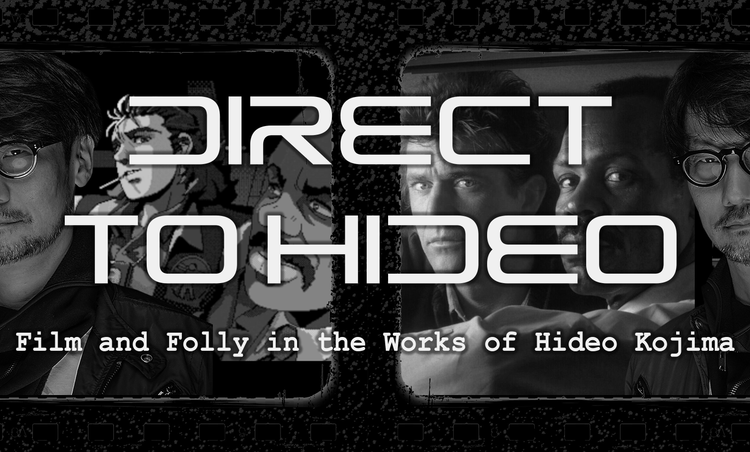
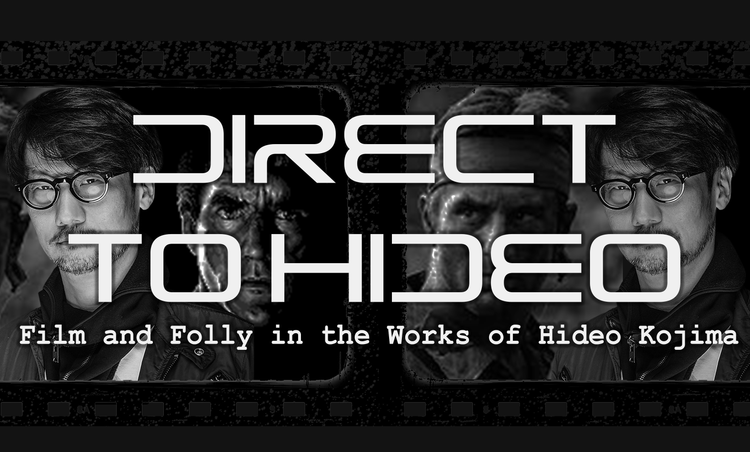
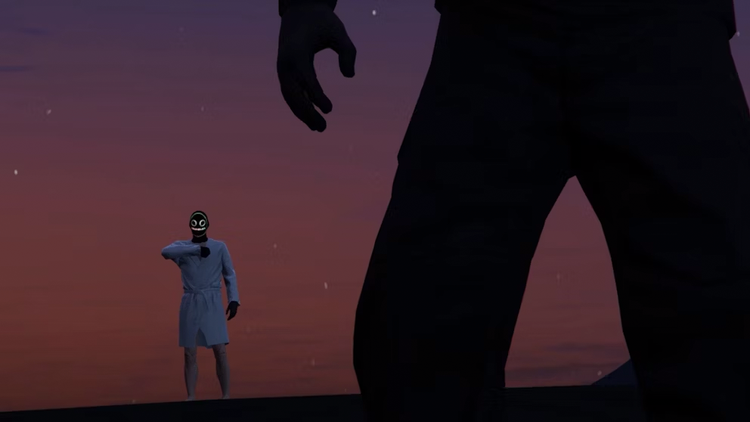
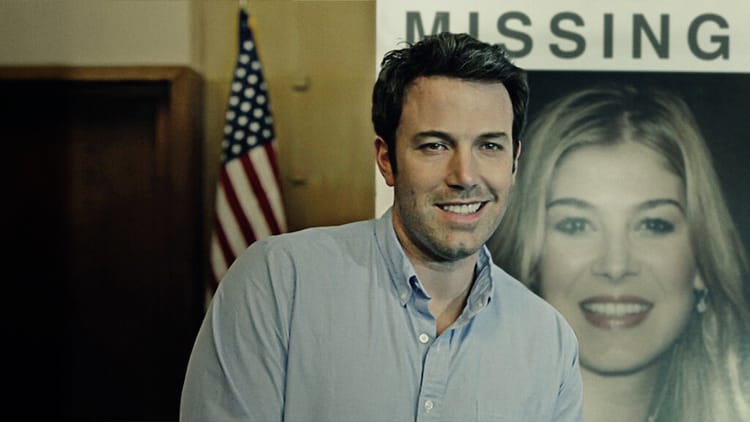
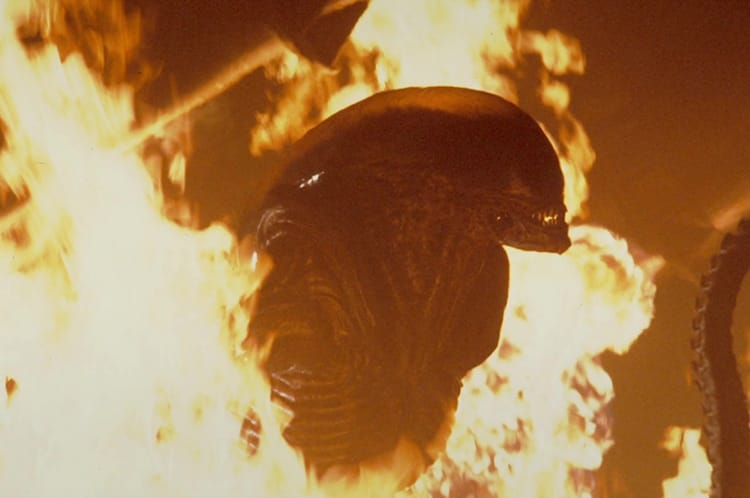
Member discussion